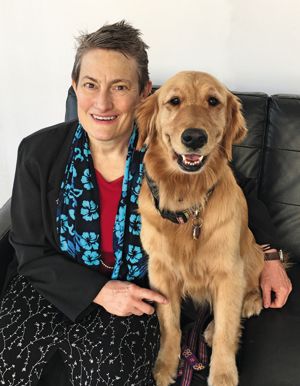Refill, sure ... but do you reassess?!
Veterinarians don't have "the magic bullet" yet to arrest or reverse degenerative joint disease in pets, so pain practitioner Robin Downing, DVM, MS, DAAPM, DACVSMR, CVPP, CCRP, says patients need, not just initial visits, but regular reassessment at their neighborhood veterinary hospital.

Dr. Downing with her dog Kula. You may be able to tell by their smiles that Kula is definitely not in pain herself. (Photo Alison Fulton)The co-owner of Windsor Veterinary Clinic and the Downing Center for Animal Pain Management in Windsor, Colorado, says she sees patients from other practices all the time whose records show treatment plans without enough rechecks.
"Every single pain patient that I see who comes into my practice who has been seen somewhere else ... is typically provided a monotherapy, a single medication, and refill, refill, refill, refill, no reassessment," Downing says in the audio clip below from her fascinating extended podcast. "Part of the dilemma we face is [the difference between] what we know about managing pain and what we do about managing pain."
Now, any time, is a great time, Downing says, to step back and reassess your own reassessment philosophy and protocols. Make sure you emphasize the three R's of pain management: recheck the patient, reassess the condition and revise your treatment plan.
"Degenerative joint disease is a progressive process, and we don't have the magic bullet to arrest that progression," Downing says. "So we need to deal with the consequences of that progression, and that means revising the pain plan."
Listen to the clip below and read more from Downing in the related links below.